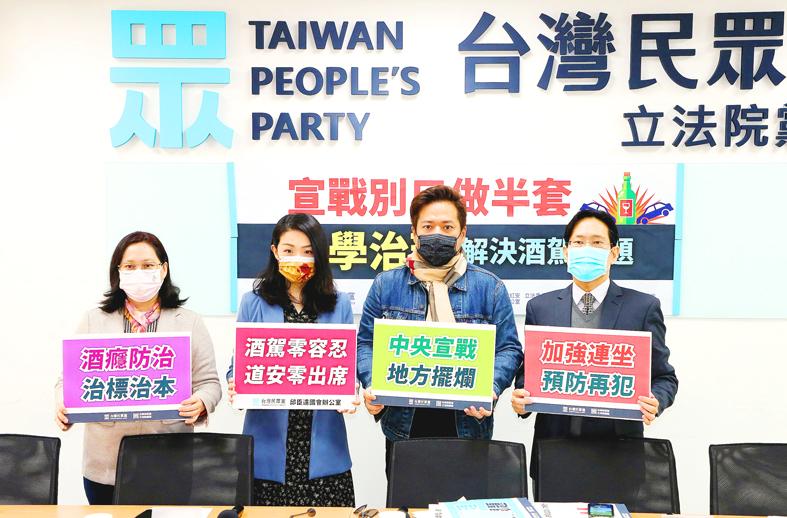Taiwan People’s Party’s (TPP) legislators yesterday urged the government to toughen penalties for drunk drivers, improve alcohol interlock devices and order convicted drunk drivers to attend intervention treatment programs to reduce drunk driving accidents.
The party’s legislative caucus held a news conference at its office in Taipei after a man allegedly drove into a family of four on a crosswalk in Kaohsiung while driving under the influence (DUI) on Sunday, killing a woman and injuring three others. The incident caused a public outcry.
Citing DUI fatalities from January to September in the six special municipalities, TPP caucus whip Chiu Chen-yuan (邱臣遠) said that while ruling Democratic Progressive Party (DPP) always “put on a show” of expressing anger toward drunk drivers after accidents, the fatalities in the three cities led by DPP mayors were the highest.

Photo: CNA
Taoyuan, Tainan and Kaohsiung each reported 27 deaths from DUI accidents, an increase of seven to nine people from last year, while four deaths were reported in Taipei and New Taipei City each, and 18 deaths were reported in Taichung, he said.
The numbers have caused people to question the government’s determination to enforce its “zero tolerance to drunk driving” policy, he added.
Chiu said a policy implemented in March last year requires repeat drunk drivers to install ignition interlock devices in their vehicles, but as of last month, only 95 of 2,367 vehicles that were required to install the device had them installed, which is an implementation rate of about 4 percent.
“Ignition interlock devices should be installed in all new vehicles in phases and related regulations should be amended so that repeat offenders and their family members’ vehicles are equipped with an ignition interlock device, copaid by fines collected from drunk driving offenders and the offenders involved in the case,” he said.
TPP Legislator Ann Kao (高虹安) said the devices should also be improved to include a facial recognition function and connected to a dashboard camera, so that drivers cannot ask other people to unlock them.
Rental car and ride-sharing operators should also have ignition interlock devices installed in their vehicles to prevent individuals from driving their vehicles while drunk, and create a better traffic safety net, she added.
Citing Taipei City Government data, TPP Legislator Tsai Pi-ru (蔡壁如) said that about 18 percent of convicted drunk drivers are caught driving drunk again within a year, but the rates fall to about 6.85 percent in one year and 11.8 percent in two years if they were admitted to an intervention program at Taipei City Hospital.
Tsai on Tuesday evening also wrote on Facebook that according to Ministry of Transportation and Communications data from the past decade, the rate of repeat drunk driving is about 37 percent.
Of the people who have been caught driving drunk more than four times, about 88.2 percent were diagnosed with alcohol addiction, Tsai added.
From criminology and public preventive healthcare perspectives, repeat drunk drivers should be admitted to a mandatory alcohol addiction treatment program and a social safety net program should follow up on their condition to effectively prevent drunk driving from the beginning, she said.

An essay competition jointly organized by a local writing society and a publisher affiliated with the Chinese Communist Party (CCP) might have contravened the Act Governing Relations Between the People of the Taiwan Area and the Mainland Area (臺灣地區與大陸地區人民關係條例), the Mainland Affairs Council (MAC) said on Thursday. “In this case, the partner organization is clearly an agency under the CCP’s Fujian Provincial Committee,” MAC Deputy Minister and spokesperson Liang Wen-chieh (梁文傑) said at a news briefing in Taipei. “It also involves bringing Taiwanese students to China with all-expenses-paid arrangements to attend award ceremonies and camps,” Liang said. Those two “characteristics” are typically sufficient

A magnitude 5.9 earthquake that struck about 33km off the coast of Hualien City was the "main shock" in a series of quakes in the area, with aftershocks expected over the next three days, the Central Weather Administration (CWA) said yesterday. Prior to the magnitude 5.9 quake shaking most of Taiwan at 6:53pm yesterday, six other earthquakes stronger than a magnitude of 4, starting with a magnitude 5.5 quake at 6:09pm, occurred in the area. CWA Seismological Center Director Wu Chien-fu (吳健富) confirmed that the quakes were all part of the same series and that the magnitude 5.5 temblor was

The brilliant blue waters, thick foliage and bucolic atmosphere on this seemingly idyllic archipelago deep in the Pacific Ocean belie the key role it now plays in a titanic geopolitical struggle. Palau is again on the front line as China, and the US and its allies prepare their forces in an intensifying contest for control over the Asia-Pacific region. The democratic nation of just 17,000 people hosts US-controlled airstrips and soon-to-be-completed radar installations that the US military describes as “critical” to monitoring vast swathes of water and airspace. It is also a key piece of the second island chain, a string of

The Central Weather Administration has issued a heat alert for southeastern Taiwan, warning of temperatures as high as 36°C today, while alerting some coastal areas of strong winds later in the day. Kaohsiung’s Neimen District (內門) and Pingtung County’s Neipu Township (內埔) are under an orange heat alert, which warns of temperatures as high as 36°C for three consecutive days, the CWA said, citing southwest winds. The heat would also extend to Tainan’s Nansi (楠西) and Yujing (玉井) districts, as well as Pingtung’s Gaoshu (高樹), Yanpu (鹽埔) and Majia (瑪家) townships, it said, forecasting highs of up to 36°C in those areas